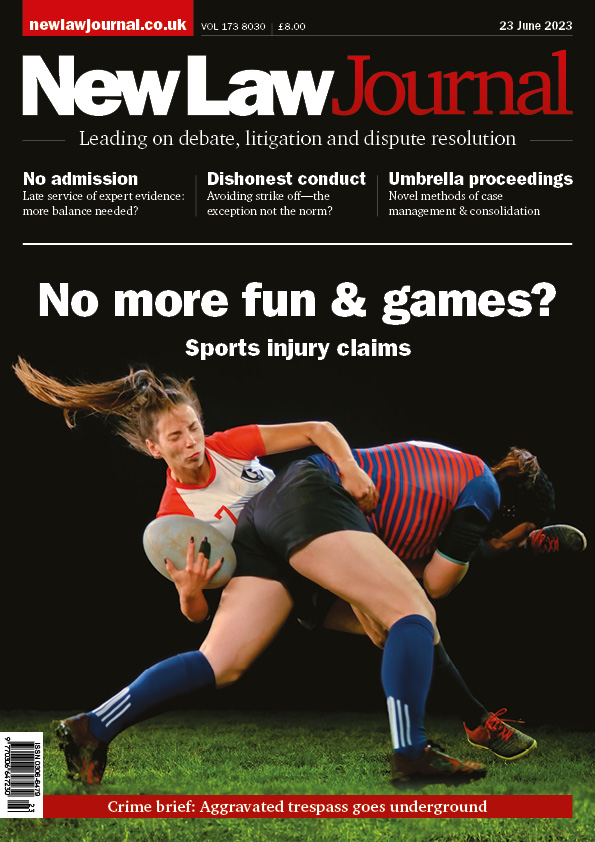THIS ISSUE

The Jackson reforms made the courts more cost-conscious and, consequently, stricter. In this week’s NLJ, Dr Chris Pamplin, editor of the UK Register of Expert Witnesses, asks whether a more balanced approach should be taken by courts which, ten years after Jackson, remain loathe to admit late expert evidence.
NLJ columnist Roger Smith reviews legal technology specialist Professor Richard Susskind’s latest book through an access to justice lens, in this week’s issue.
The construction of HS2 has provided work for criminal lawyers as well as construction engineers, writes NLJ columnist David Walbank KC, of Red Lion Chambers, in this week’s ‘Crime Brief’. Walbank looks at the recent case concerning protestors who tunnelled beneath Euston Square Gardens in central London.
Dishonesty is certainly in the headlines this week, but politics aside, what happens when solicitors are dishonest? In this week’s NLJ, Jessica Clay and Lucinda Soon examine the ‘exceptional circumstances’ which can save a dishonest solicitor from being struck off.
No matter the advances of legal tech in widening access to justice, there will always be a place for human advisers, as Roger Smith explains
When does dishonest conduct in the solicitors’ profession not lead to strike-off? Jessica Clay & Lucinda Soon consider some exceptional circumstances
Novel methods of case management & consolidation are emerging in the Competition Appeal Tribunal: Annabel Elliott considers the umbrella proceedings order one year on
Vijay Ganapathy discusses recent developments in sports injury & noise-induced hearing loss claims, plus the rules on limitation for professional negligence cases
Agency fees or expert fees? Masood Ahmed & Lal Akhter clarify the rules surrounding fees paid to a medical reporting organisation when assessing costs
Thus far, arguably the most significant output of the HS2 project has been a stream of litigation: David Walbank KC charts the path to judicial review
MOVERS & SHAKERS

Keystone Law—Milena Szuniewicz-Wenzel & Ian Hopkinson
International arbitration team strengthened by double partner hire

Coodes Solicitors—Pam Johns, Rachel Pearce & Bradley Kaine
Firm celebrates trio holding senior regional law society and junior lawyers division roles

Michelman Robinson—Sukhi Kaler
Partner joins commercial and business litigation team in London
NEWS
The Legal Action Group (LAG)—the UK charity dedicated to advancing access to justice—has unveiled its calendar of training courses, seminars and conferences designed to support lawyers, advisers and other legal professionals in tackling key areas of public interest law
The Police and Criminal Evidence Act 1984 transformed criminal justice. Writing in NLJ this week, Ed Cape of UWE and Matthew Hardcastle and Sandra Paul of Kingsley Napley trace its ‘seismic impact’
Operational resilience is no longer optional. Writing in NLJ this week, Emma Radmore and Michael Lewis of Womble Bond Dickinson explain how UK regulators expect firms to identify ‘important business services’ that could cause ‘intolerable levels of harm’ if disrupted
As the drip-feed of Epstein disclosures fuels ‘collateral damage’, the rush to cry misconduct in public office may be premature. Writing in NLJ this week, David Locke of Hill Dickinson warns that the offence is no catch-all for political embarrassment. It demands a ‘grave departure’ from proper standards, an ‘abuse of the public’s trust’ and conduct ‘sufficiently serious to warrant criminal punishment’
Employment law is shifting at the margins. In his latest Employment Law Brief for NLJ this week, Ian Smith of Norwich Law School examines a Court of Appeal ruling confirming that volunteers are not a special legal species and may qualify as ‘workers’







